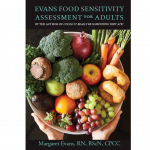
Order the Assessment!
Evans Food Sensitivity Assessment for Adults

Ordinary Courage – a great phrase and one that is used often by Brene Brown. How would you define ordinary courage? If you had it, how would it impact your life?
Brene Brown defines ordinary courage as the willingness to speak honestly and openly about who we are. It is allowing yourself to be vulnerable and open about both your successes and your failures. She has been doing research for years on the topic of shame and how practicing ordinary courage is one of the antidotes to allowing shame to minimze who we are.
Shame is believing there is something inherintely wrong or deficient about us. This is different from guilt which is what we feel when we do something that is inconsistent with who we want to be. Guilt can motivate us to change our behaviour whereas shame results in us hiding who we are for fear of the judgement of others. In her book ” I Thought It Was Just Me (but it wasn’t)”, Brene talks about how to increase our resilience to shame. Shame is a universal experience and one that can bring great pain to our lives if we allow it to fester and take root in our heart and our soul.
The biggest antidote to shame is empathy. Empathy is the quality we look for in our friends and family that allows us to feel heard. Brene Brown offers these four qualities as the ones well developed in people who successfully offer empathy to the people in their life. Take a few minutes and notice who in your life offers this experience of safety for you.
Empathetic people:
1. Are able to see the world as others see it. They are able to let go of their own beliefs, perspectives, and judgements long enough to be open and curious about the other person’s feelings and point of view.
2. Are nonjudgmental about the stories and experiences of others. They listen with their heart and make every effort to be open to what is being shared with them without criticism or passing judgment.
3. Are able to understand another person’s feelings. They are able to hear what is being said and also what is unspoken and conveyed by body language. They are able to reflect back to the other person the emotions they are noticing to check in to see if they are correct. They do not need to fix the problem or offer solutions but are able to simply honour the other person’s experience.
4. Communicate their understanding to the other person. They actively listen to the other person and give them their full attention. They may share a short personal experience that is similar in order to convey that they truly understand. Even if they have no personal experience with the issue being presented, they are still able to offer a listening ear, a kind and accepting heart, and a willingness to offer their time and their support. As Wendy Harphum writes, they respond by saying “I hear you and I am here”.
Only when we are offered warm, accepting empathy from people who are willing to invest in our relationship, can be find ways to navigate through our feelings of shame. It is by cultivating safe and nourishing relationships where we can be vulnerable and open about our feelings and experiences that we can reconnect to the ordinary courage that we have. We are then able to safely share who we are, what we want, and celebrate both our successes and failures as simply being part of the journey of being human. We are loved and accepted for who we are and no longer need to pretend to be something else in order to be loved, accepted, and heard.
To read more about ordinary courage, check out Brene Brown’s website at http://www.ordinarycourage.com/ She also has a number of wonderful short talks on shame, vulnerabilty, ordinary courage and other topics on You tube and also on Ted Talks.